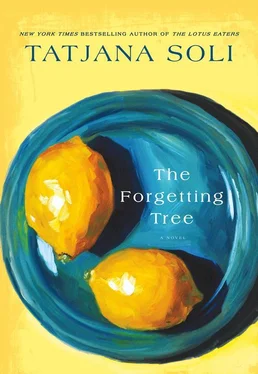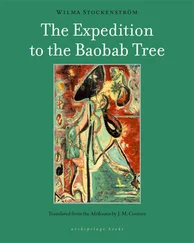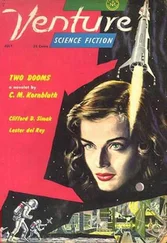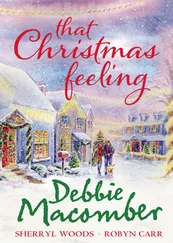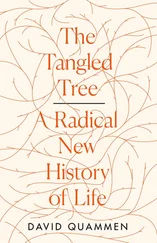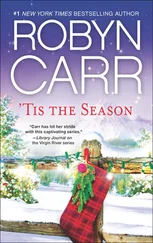The taillights were at the end of the drive before Claire could thank her. Minna was right. She was where she had fought to be, having achieved her dubious goal, buried away in the middle of her groves. Claire turned her back on the car, her fleeing daughters, opened the book to the first page and hungrily began to read.
They settled into a pattern of days.
Mornings were hardest. Knowledge of the cancer like a weight. Each morning Claire woke, the fact of the disease pressed down on her like a stone lid, like a tombstone, a covering of earth. She was accustomed to a cloistered solitude, had been reinforcing its walls for all the years since Joshua’s death, freely perambulating the garden in housecoat and slippers, sipping her oversize cup of coffee as her fingers trailed elegiac lavender heads and spiky, stick-leaved rosemary, cradled flesh-soft roseheads and dimpled citrus. Her garden and the ranch beyond it had always given her such consolation, but now she gazed on it as one about to go away on a long journey. Paradoxical since she had fought so hard to stay on the ranch; it had ended being her sole victory.
But the atmosphere of the farm had changed. She felt eyes watched her. In addition to Minna, there was Paz, who came once a week for cleaning. They hadn’t seen each other in a year when she came through the door. She went to Claire and buried her face on her shoulder. “How are you, mi tía ?” Claire marveled at how self-assured she had become since she’d been away at college. “I wish you would have let me care for you.”
“Give me my wish — your name on the door of a law office.”
Paz blushed. “Among other things. It’s official — Steven and I are marrying at the end of the year. You’ll come?”
Of course, Claire thought, if I’m here. “Are you sure you have time for this?”
“Spending money.” Paz laughed. “School’s expensive.”
Even during the times that no one was at the ranch, the possibility of it threw a veil of self-consciousness over all Claire did and saw. My lavender, she repeated to herself. My rosemary, my roses, my farm. But despite the insistence, it now seemed a changing and remote landscape.
* * *
The doctor sent thick booklets describing the procedures of chemotherapy and radiation, and Claire signed endless papers stating than she understood the risks, would hold harmless those who would poison her with the intention of a more ultimate health. She tried to distract herself with the activities of the farm, but it seemed as if her old life had been transcribed into a language she could not understand.
“What do you think about spraying the back field?” Octavio asked.
“Yes. I think so. I don’t know. What do you think?”
“Should I ask Mr. Forster?”
“No. No need to. I’m fine.”
“I think you do too much. You need rest to get back your health.”
“I’m fine. This is what I need.”
* * *
Instead of the farm, Claire plunged into the most private of worlds, the pages of a novel, for comfort. That old luxuriousness like a warm bath that she had not realized how much she missed. The book Minna gave her was a weathered, smallish hardback. The pages yellowed and brittle and smelling, she imagined, of faded spices. Claire stared at the signature for long moments, feeling a thrill that the author had actually held this volume; it made the reading more urgent.
Rereading a book was a different experience from coming upon it for the first time. Especially if it was well-loved, like a favorite piece of music, it was capable of taking you back to a former self. In college, it was a revelation that the madwoman, Bertha, in the attic of Jane Eyre, might actually have an argument, might actually be a human being; moreover, a wronged one. That there were explanations for the crazy behavior. That the tall, dark, stoic Rochester might just be a misogynistic schemer. A newlywed when Claire next reread it, unpacking her boxes of books in her new home under Hanni’s scrutiny, this time she was much taken by the sensuality of the island, and the newlywed status of Antoinette and Rochester. That, too, had been omitted from Jane Eyre, as if Jane were jealous of Rochester’s erotic past. Now, all these years later, she identified with Antoinette’s mother, Annette, her fear, a common fear of women through time, that her better days might be behind her. How could she not try for all the things that had gone so suddenly, so without warning. Then, so close to the relief of marrying Mr. Mason, the death of a son now doubly destroyed Claire. Claire had to lay down the book and take breaks while reading the passage in which Annette’s son dies.
From the vantage of her older self, Claire knew that when disaster struck, no matter how long prepared against, it was always sudden, always took your breath away. That much she understood. Some might consider Claire herself a madwoman, one in a citrus orchard instead of locked up in an attic. But she understood why the mother insisted on riding out on her horse each morning in her shabby clothes, despite the jeers, why she kept walking up and down the glacis, keeping vigil over her abandoned Coulibri and all the things that were now a thing of the past. If one gave up the past, what was there?
In the year following Josh’s death, the newspapers filled with the court case and then the sentencing of the three men, Claire had gone into town, alone or with the girls, and experienced repeatedly the hushed silence when entering a store or restaurant, the whispers, “That’s her!” She had achieved a macabre, unwanted celebrity. The fruit stand sold out daily for a year before attention finally shifted away.
She would not allow her illness to turn her into an object of pity; she refused to be sequestered. Instead of staying in the house, she put on jeans and sneakers, a sweatshirt over her bandaged chest, snuck into the orchards, and took long walks along the snaking rows of citrus. She wore a large-brimmed straw hat, hiding her face, the skin that would be sensitized by the chemo. The workers who saw her, probably thinking that she was indeed a madwoman, dodged out of her way quickly, making her privacy so complete and absolute it was almost as if she were invisible.
Claire spent long hours reading on the couch, and Minna served her thick, frothy health drinks.
“I can’t. I’m not hungry.”
“This is important. Builds the blood.”
Claire sipped and grimaced. “What is it?”
“Secret recipe from Maman .”
* * *
The following Monday would be Claire’s first chemo treatment, so she tried to luxuriate in the last days when she was still free to pretend away her illness. Mrs. Girbaldi was hosting her annual fund-raiser for animals, and although Claire shrank away from the effort of having to socialize, she decided she should go because to attempt to live a normal life seemed essential for what lay ahead.
Saturday morning Minna and Claire sat over coffee and newspapers on the patio. Paz was mopping in the living room, and Claire did her best not to hover over the girl. The house hardly felt hers anymore. Not only did Paz’s presence make her uneasy, she itched to correct details, such as the amount of oil used on the floor. Paz used too much and left behind a faint tackiness on bare feet. Not having control irritated Claire. When the mop handle clattered on the floor inside, she jumped, still groggy from having read late into the night.
Minna stood and looked out over the orchards. “This is a God place.”
“Excuse me?”
“You are lucky to have this. There are powers here.”
“It’s true. I draw strength here.”
“It can heal you if you allow it. Maman said trees healed you.”
Читать дальше
